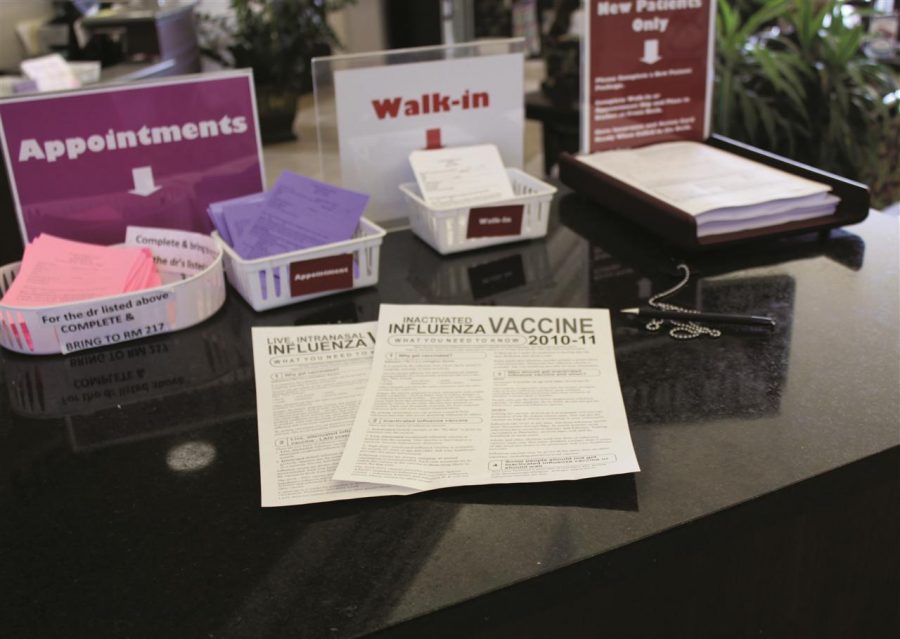 Despite last year’s H1N1 outbreak, the Student Health Center is expecting a typical flu season this year, SHC Nurse Supervisor David Brown said.
Despite last year’s H1N1 outbreak, the Student Health Center is expecting a typical flu season this year, SHC Nurse Supervisor David Brown said.
“We don’t have any number predictions, but we’re expecting a normal flu season,” Brown said. “We’re not seeing droves. Prevention is the best thing — if we all practice prevention, it won’t be a big flu season.”
Symptoms of the common flu include, but are not limited to, a fever of about 102 degrees or higher, headache, body aches, runny or stuffy nose and a sore throat, according to the Centers for Disease Control and Prevention. The flu spreads through the air when an infected person coughs, sneezes or talks. People can also become infected by touching an object with the influenza virus on it and then touching their eyes, nose or mouth, the CDC states.
At last week’s Health Fair, the Health Center gave more than 150 flu shots to students, faculty and staff. But just getting the vaccine won’t prevent getting sick—it has to be administered at the first sign of flu season, Brown said.
“The first line of defense against catching the flu is the flu shot,” Brown said. “I recommend getting it as soon as you can. You can make an appointment at the Health Center, but we take walk-ins too.”
After the 2009 H1N1 outbreak, the vaccine protects against influenza types A and B, as well as the H1N1 virus. The SHC offers flu vaccinations in their main office and also plans to set up vaccination clinics across campus starting today.
“We’ll be giving shots at clinics around campus next week,” Brown said. “We’ll be set up at the Ferg and in front of the dorms. We’re trying to make it as accessible as possible.”
The SHC also offers another option besides the flu injection. The flu mist is a nasal spray that contains live, but weakened, influenza virus, according to the CDC. It is sprayed into the nostrils and protects against the flu for 12 months as opposed to the vaccine, which contains dead virus particles and lasts for six months. The mist is available for anyone who doesn’t have long-term health problems such as asthma, anemia or diseases that compromise the immune system.
Flu prevention is as simple as being more cautious of one’s surroundings, Brown said.
“I always say: wash your hands, wash your hands, wash your hands,” he said.
Hand washing, keeping mouths covered when coughing and disinfecting all the surfaces around one’s home or workplace will significantly lower the risk of contracting the flu. Brown also suggested carrying around a small bottle of hand sanitizer to use throughout the day.
If you do happen to catch the flu, Dr. Irma Higginbotham recommended laying low for as long as possible, despite a busy schedule.
“Take some Tylenol or Motrin to keep your fever down, rest as much as possible
and drink a lot of fluids,” Higginbotham said. “I know [students] have classes and they have to study, but if it’s possible, stay at home so you don’t spread it all over campus.”
Higginbotham also advised students, faculty and staff to seek medical
attention if their symptoms become severe.
“If they really are running a high fever, I would recommend to come [to the SHC] and be checked out,” Higginbotham said. “If we check them and immediately start treating them with anti-viral medications, like Tamiflu, within the first 48 hours, we can reduce their time being sick and reduce their symptoms.”
Jack Lester, a junior double majoring in psychology and telecommunications and film, said he always prepares for flu season.
“I plan to get the vaccine at the Student Health Center or another doctor’s office when I go home,” Lester said. “I always keep Gatorade and chicken soup on hand, just in case. I try to use hand sanitizer as much as possible.”
Other students like Ginny Imbrogno, a junior majoring in telecommunications and film, said they don’t let flu season interrupt their normal routines.
“I know I should, but I really don’t do anything for flu season,” Imbrogno said. “I don’t get the flu shot. I do get allergy shots every week, but that’s pretty normal.”
The SHC will be giving flu shots throughout flu season for a $20 fee. To look up vaccine clinic locations around campus, visit the UA Student Health Center’s Facebook page or call them at 348-6262.









